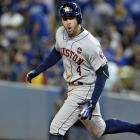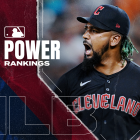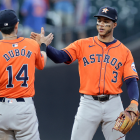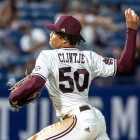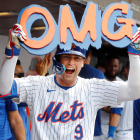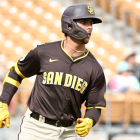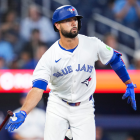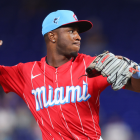LOS ANGELES -- In retrospect, we should have seen it coming. When the great Vin Scully walked onto the field at majestic Dodger Stadium to address the crowd, we should have known. When he made us laugh and tear up, reminiscing about Jackie and the Duke, we should have raised our expectations. When he brought Fernando Valenzuela out to take his place on the mound and deliver the ceremonial first pitch in his stead, we should have sensed that all of us in attendance were in for a night of baseball magic that none of us would ever forget.
The Astros' 7-6 victory over the Dodgers in Game 2 of the World Series on Wednesday night felt like nothing less than the world's biggest roller-coaster ride. It was terrifying and exhilarating, breath-catching and heart-stopping. It was the kind of game that needs more than words to properly describe. It needs an image that properly conveys what a baseball fan's non-stop heart attack looks like.
Fortunately, we have exactly that kind of image at our disposal: a win probability chart. Much like a cardiogram tracks a heart's movements over time, a win probability chart lays out all of the events that take place in a baseball game, with big spikes and plunges coming during game-changing moments. The chart that tracked the action in Game 2 looks like a heart reading on that roller coaster of our imagination ... if the roller coaster went 600 mph, had no lap bar and was perched on the top of a space shuttle, streaking toward the stratosphere.
So let's tell the story of Game 2 using the win probability chart from Fangraphs. For each major moment, we'll circle the spike on the chart. Come follow along, as we descend into a night of baseball anarchy.
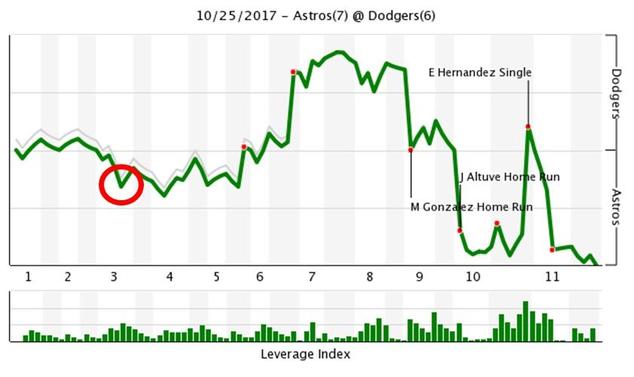
Every showstopper needs a warmup act, and this one was it for Game 2. With runners on first and third and one out in the top of the third, Alex Bregman rapped a single to center, cashing Josh Reddick for the game's first run. At that point, the Dodgers' win probability stood at 34 percent, so we can flip that around and peg Houston's shot at winning at 66 percent -- a two in three likelihood.
This would prove to be the only run the Astros tallied off Dodgers starter Rich Hill. True to his recent tendencies, Dodgers manager Dave Roberts handled Hill with kid gloves, pulling him after four innings. Hill's line for the game: that one run on three hits, with three walks and seven strikeouts. The damage could have been worse but for two factors. First, the Astros bailed Hill out in the first, with Bregman, Altuve and Correa all ending their at-bats in outs after swinging at fastballs out of the zone, thus wasting George Springer's leadoff walk. Second, Roberts ended Hill's night after the lefty faced just 17 batters. Analytical thinkers believe that pitchers are generally more likely to fail as they face the opponent's lineup for a third time. The sabermetrically wired Dodgers know that all too well, and enforce that limit most strictly on Hill.
You never know how the early innings of a game might influence what happens at the end. But between Hill wiggling out of early trouble in the first, then exiting early enough to avoid further damage, you had to wonder if Houston might pay for doing no better than a 1-0 lead through four. On the other hand, you could turn that around and wonder how smoothly the next five innings might go for the Dodgers when matched up against a potent Astros offense. Would the to-that-point red-hot L.A. bullpen be able to hold the fort for 15 more outs (or more)?

Coming into Wednesday's game, only two pitchers had ever thrown a no-hitter in a playoff game: Don Larsen threw a perfect game against the Dodgers in the 1956 World Series, and Roy Halladay fired a no-hitter against the Reds to open the NLDS in 2010. With such a scant history of no-nos over 113 seasons of playoff baseball, the odds would lead you to believe that it might be decades before we see another one.
Justin Verlander is one of the incredibly rare pitchers who can make you believe. The Astros' right-handed ace had gone 4-0 in the 2017 playoffs heading into his Game 2 start, with a 1.45 ERA. He went the distance in Game 2 of the ALCS, punching out 13 Yankees over nine innings of one-run, five-hit ball. So when he blazed through the Dodgers lineup the first time without allowing a base-runner, you couldn't help but start to believe. The delightfully disruptive Chris Taylor broke up any perfecto talk with a leadoff walk in the fourth, only for the threat to peter out when Justin Turner bounced into an inning-ending double play.
Hmmm…

The beauty of the postseason -- unlike with the grind of a 162-game regular season -- is that everything can turn in a single moment. Once you leave fate up to such a tiny sample size of events, you open the possibility of a bit player suddenly becoming a legend by dint of one big play. Ask Mickey Hatcher ... or Brian and Denny Doyle ... or Buddy Biancalana what can happen when an unheralded bench jockey suddenly gets a shot when the playoff lights shine brightest.
Joc Pederson was considered one of the most promising young stars in baseball just two years ago, following a rookie campaign in which he slugged 26 homers, made the All-Star team and finished sixth in Rookie of the Year voting. Since then he had earned multiple demotions to the minors and settled into a role as a part-time player on a Dodgers squad loaded with attractive options. The fourth pitch of Pederson's at-bat against Verlander in the bottom of the fifth was a hanging slider. Bad idea. Joc rocked the pitch 392 feet, powering it into the right-field bleachers. After 4 2/3 innings, the no-hitter was gone, the shutout was gone and Pederson got his back-from-the-dead moment six nights before Halloween.
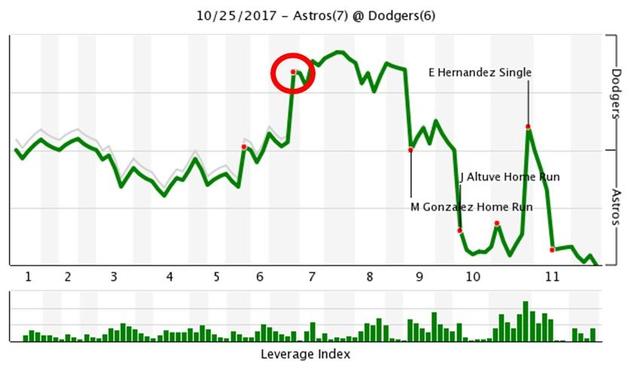
Hey look, it's Chris Taylor causing mayhem again, drawing a two-out walk to extend the inning. That brought Corey Seager to the plate.
Seager had made an impressive return to the active roster in Game 1 of the World Series, slapping a pair of singles in his return from a back injury that sidelined him during the NLCS against the Cubs. Still, it's always tough to know how long an injury might linger, and if Seager could rediscover the power stroke that fueled his 22-homer regular season.
No need to wonder any longer. Verlander hurled four straight fastballs to Seager, and Seager connected on the last of the four, going opposite field with such force that he started celebrating the nanosecond he followed through on his swing.
Corey Seager started celebrating as soon as he hit it. pic.twitter.com/FvROXke4cm
— Kenny Ducey (@KennyDucey) October 26, 2017
Verlander's bid to join the Don Larsen Club was now long gone, the Dodgers had now built a win probability of 84 percent, and the Astros were nine outs away from going down 2-0 in the series.

Saying baseball is a game of inches might actually underestimate the microscopically thin margins that can separate victory from defeat. As the token Canadian here, let's try this instead: Baseball is a game of millimeters, and this game featured multiple weird plays that went one way or the other by slim margins.
We got one of those moments leading off the eighth inning. With Roberts running low on reliable relievers, he left setup man Brandon Morrow in to start the frame, hoping to take a little of the closing burden off Kenley Jansen; ask Jansen to get four or even five outs, and that would still be better than demanding six. So when Bregman sliced a ball toward the right-field corner, Jansen's workload, and his ability to have an easier time of closing out the game, lay in the balance.
Yasiel Puig did some laying out of his own, getting a good jump on the ball, then diving in an attempt to snare it. He missed by ... this much.
Puig could almost literally not have been closer to catching Bregman's double in the eighth inning. He got his glove on it. pic.twitter.com/3io8ICglAo
— Mike Petriello (@mike_petriello) October 26, 2017
Correa followed with a bouncing single up the middle two batters later and the Astros were now within one, having halted the Dodgers bullpen's scoreless streak at 28 innings. Little did anyone know that one of the wildest, and most sudden bursts of run-scoring mania in World Series history was about to turn this game into a series of rapid-fire shots to the heart.

Dodgers win probability at start of ninth inning: 85 percent.
Dodgers/Astros win probably after Marwin Gonzalez, a 28-year-old superutilityman who morphed into one of the most potent hitters in baseball completely out of nowhere this year, smoked a 398-foot homer over the wall in center: 50 percent.
.@marwingf9, how clutch are you?! #WorldSeries pic.twitter.com/xPLfUtoNyB
— MLB (@MLB) October 26, 2017
As human beings, we're always desperate to find an obvious explanation -- and a useful scapegoat -- for every outcome. The Dodgers were on the verge of pushing the series to Houston with a 2-0 lead ... until they weren't, because Jansen couldn't hold the lead. But other than mysteriously shuttling middling right-hander Ross Stripling into a big spot leading off the seventh, only to pull him from the game one batter later (after a walk), Roberts hadn't done anything that could be considered tactically wrong with his pitching staff.
He pulled Hill after four innings because he and his bosses are acutely aware of the third-time-through-the-order penalty, and because Hill in particular is an injury-prone and sometimes erratic pitcher whose profile screams out for you to cash your chips out as quickly as possible when he's going well. And he went to Jansen for six outs because that's when you do when you have a pitcher who can best be described as a bigger, stronger Mariano Rivera when he's at his best. Jansen simply got beat by a good hitter.
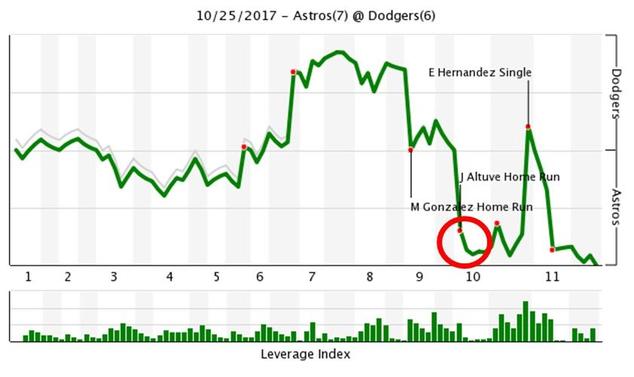
Jose Altuve and Carlos Correa, the generationally dazzling Astros double-play combination that had been so great during the regular season (with Altuve clubbing five homers this postseason as well), had suddenly gone ice cold. Heading into this game, Altuve and Correa had gone 8 for their previous 46 on the road. Who knew when, or if, they would snap out of that funk before the end of these playoffs.
Then this happened:
The Dodgers being forced to use a shaky right-hander with a sky-high home-run rate like Josh Fields was asking for trouble. But the back-to-back jacks by Altuve and Correa (the first ever in extra innings of a World Series game) offered a stark reminder that momentum means nothing in baseball, and that it's silly to bestow any predictive value at all on it. Put two elite hitters up against one of the most prolific tater servers since your middle-school cafeteria, and this is what you get.
Carlos Correa with the 🔥 bat flip and Puig troll 👅 😂 #WorldSeries #EarnHistory pic.twitter.com/bF2zdgkphs
— Josh Handszer (@joshhandszer) October 26, 2017
By win probability, the Dodgers now have a scant 6.5 percent chance to pull this game out. Now, the madness can truly begin.
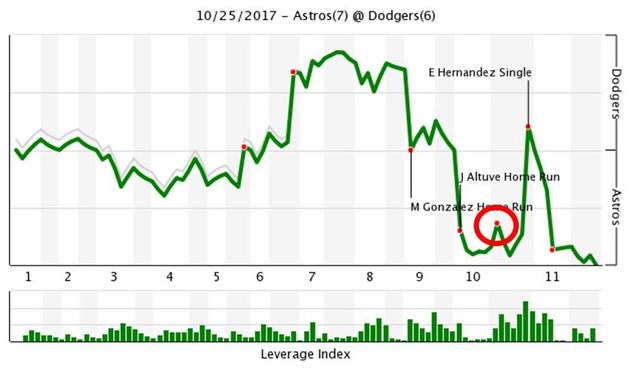
Oops, there's Puig! The wild horse bashes a homer to left to cut the Dodgers deficit to 5-4, countering Correa's momentous bat flip with a quietly emphatic setting of the bat on the ground. Still, with three outs to go, they still hold just an 18.2 percent chance of winning, and that's not …
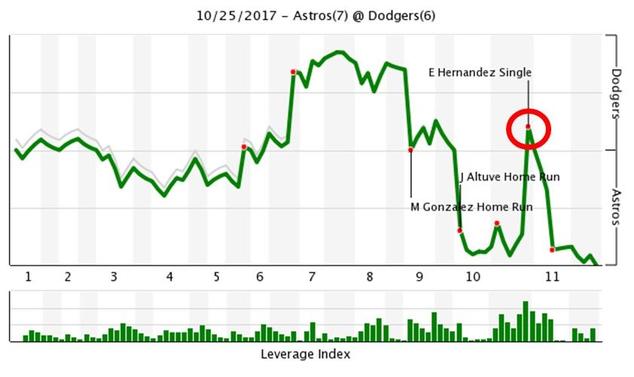
Wait, what just happened?!?! Logan Forsythe grinded disintegrating Astros closer Ken Giles into a two-out walk. He scooted to second on a wild pitch that seemed to bounce 15 feet in front of home plate, then slid home in the nick of time on an Enrique Hernandez single to, incredibly, tie the score at 5-5.
What a rollercoaster of emotions. @kikehndez’s RBI single in the 10th was absolute madness 🍌 pic.twitter.com/8xD9zXKvjV
— Stacie Wheeler (@StacieMWheeler) October 26, 2017
This game is officially on all the drugs.

I know what you're thinking, they must have used my hand double for this promo. Haha. Free TACOS for everyone, thanks @tacobell. https://t.co/NZxveDV1cM
— Cameron Maybin (@CameronMaybin) October 26, 2017

George Springer heading into the 11th inning of Game 2: 3 for 30
George Springer in the 11th inning of Game 2: 1 for 1, with a two-run homer
Few teams in baseball history are going to look anything but badly exposed when their Nos. 7 and 8 options out of the bullpen are forced to pitch against the most potent offense in the majors with the game on the line. As a result, we get the first team ever to homer in the ninth, 10th and 11th innings of a postseason game.
WHAT A GAME!!! WHAT A WIN FOR THE @ASTROS!!!
— 🚢Titanic Baseball⚾️ (@TitanicBaseball) October 26, 2017
GEORGE SPRINGER'S GO AHEAD 2-RUN HOME RUN IS EVEN BETTER WITH TITANIC MUSIC!!!
⚾️🚢🎶 pic.twitter.com/j8KGBkm6mD

What's one more burst of madness between friends, right? Seldom-used utilityman Charlie Culberson's unlikely homer cut Houston's lead to 7-6, triggering a small, last-gasp spike to a 4.2 percent win probability, with just one out to go. Culberson took some flak from Astros players and other observers for pointing at the bleachers as he rounded the bases ... except he was pointing at his family. Also, it's Charlie f'ing Culberson. If he wanted to bring a Mariachi band on the field to celebrate with him, everyone should have allowed it.
Culberson's homer also gave two absolutely jaw-dropping stats on the night. First, the two teams' combined eight home runs set a World Series record. Second, there had been 17 extra-inning homers in World Series history before Wednesday night's contest. There were five hit in a span of 42 minutes in this game.
The Astros' stirring win has already triggered a new round of completely made-up narratives. Their confidence is now back. They have to be feeling so great going back to Houston after this win. The bats have woken up, and an offensive onslaught at Minute Maid Park is now sure to happen. Dickie Thon is going to be the next President of the United States.
But the reality is, none of us have any idea what's going to happen next. From Mo 2.0 blowing the game to a pair of slumping stars silencing an entire sold-out stadium to a third-string shortstop raising the ire of an entire state and becoming a trending topic for doing something that 99.99999999999999999 percent of human beings will never dream of doing, you never know what baseball's going to give you next.
Why would we ever want it any other way?









